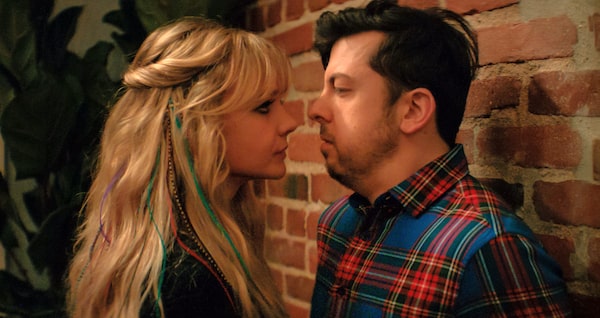
Carey Mulligan stars in director Emerald Fennell’s Promising Young Woman.Courtesy of Focus Features
- Promising Young Woman
- Written and directed by Emerald Fennell
- Starring Carey Mulligan, Bo Burnham and Alison Brie
- Classification R; 113 minutes
There is a scene in Promising Young Woman where Cassandra (Carey Mulligan), a thirty-something barista out to set sexual predators straight, is in conversation with one of her “victims.” He expresses that being accused of sexual misconduct is a man’s “worst nightmare.” To which she responds: “Do you know what a woman’s is?”
The exchange is a riff on a famous Margaret Atwood anecdote that any young woman who has spent enough time on feminist blogs (what I assume is this film’s target demographic) is instantly familiar with. Atwood asks a male friend why men feel threatened by women. “They’re afraid women will laugh at them,” he responds. But when Atwood asks women why they feel threatened by men, their answer is far more pointed: “We’re afraid of being killed.”
Promising Young Woman, a rape-revenge fantasy which never once uses the words “rape” or “assault” or even “consent,” is about what happens when the justice system fails – and comeuppance is left in the hands of survivors or their allies.
A solid debut feature from writer-director Emerald Fennell, best known for producing the second season of television series Killing Eve, Promising Young Woman highlights the various types of men modern women usually encounter. There’s the guy who tells you about his crappy novel while citing David Foster Wallace. The guy who offers to help find you a ride home. The guy who insists he’s one of the “nice” ones.
Fennell’s on-screen gallery of guys will be recognizable to any woman who knows anything about contemporary dating, yet her lineup of usual suspects is almost too on-the-nose. The script often feels like listening in on Twitter discussions of the past few years, with the dialogue reflecting such formulaic rejoinders as, “What did she expect would happen if she was blackout drunk?”
By day, Cassandra leads an unambitious life. She aimlessly works at a coffee shop with her manager and only friend, Gail (Laverne Cox, who unfortunately takes on the role of the Black best friend whose every line is in service to the white main character). She lives at home with her parents, who are clearly worried about how their daughter is spending her free time since mysteriously dropping out of medical school years ago.

Mulligan plays a woman who goes out each weekend and pretends to be drunk, aiming to get taken home by potential sexual predators to whom she can teach a lesson.Courtesy of Focus Features/Courtesy of Focus Features
And they’re right to worry. Every weekend, Cassandra goes out to bars and clubs, where she pretends to be extremely drunk, with the aim of getting taken home by sexual predators sensing opportunity. Why? Well, Cassandra wants to teach them a lesson. We never see exactly how she does this, beyond a scene where she gives one of the men (Christopher Mintz-Plasse) a stern talking-to, which makes for an amusing yet ultimately unsatisfying confrontation. Through the way she’s tallied them up in a mysterious notebook, we see that Cassandra has done this enough times that her act is a well-oiled machine – but we’re left trying to figure out the strategy.
When Cassandra begins dating a former med-school classmate, Ryan (a charming Bo Burnham), the movie starts ramping up into something exhilarating – but takes far too long to get there. We finally begin to understand Cassandra’s motives, allowing the dramatic stakes to be raised, but in a way that makes much of the earlier part of the film seem frivolous by comparison. Once the story’s endgame became clearer, it keeps viewers on edge and all-in – and leaves you frankly grateful for its view on how truly broken the justice system is.
Mulligan plays the hard-as-nails Cassandra with the controlled determination of a woman who has nothing to lose, in a way that makes the film a fantasy in the darkest way possible. In real life, we know what happens to men who make what many perceive as “drunken mistakes” – and the women who find themselves shattered because of their actions.
Fennell builds a backward fantasy that feels ultimately cathartic in a very real way, but where its opening tone comes across as far too light for the palpable gravity of its ending.
Promising Young Woman is available digitally on-demand, including Apple TV, Google Play and the Cineplex Store, starting Jan. 15
Plan your screen time with the weekly What to Watch newsletter. Sign up today.